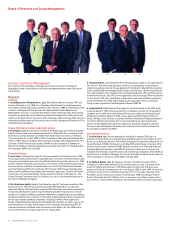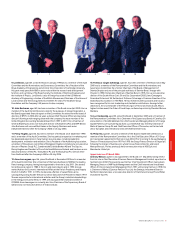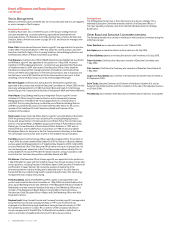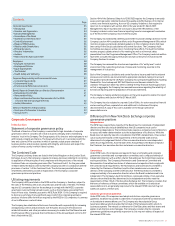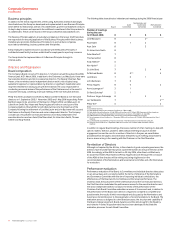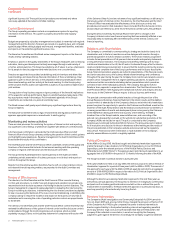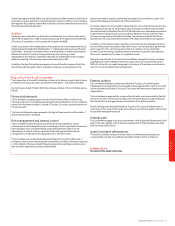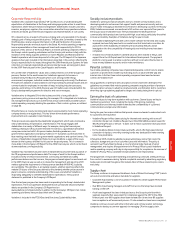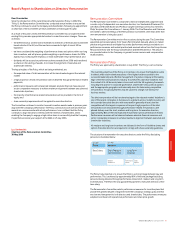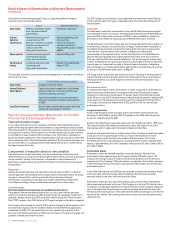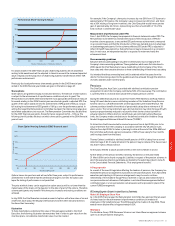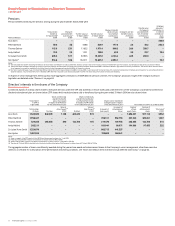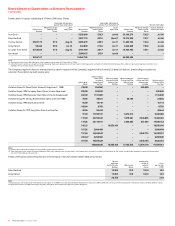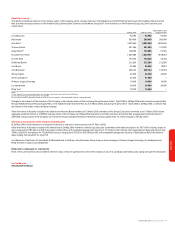Vodafone 2006 Annual Report Download - page 61
Download and view the complete annual report
Please find page 61 of the 2006 Vodafone annual report below. You can navigate through the pages in the report by either clicking on the pages listed below, or by using the keyword search tool below to find specific information within the annual report.
Vodafone Group Plc Annual Report 2006 59
Corporate Responsibility and Environmental Issues
Corporate Responsibility
Vodafone sees corporate responsibility (“CR”) as the process of understanding the
expectations of stakeholders in the Group and taking appropriate action to meet those
expectations where they are realistic and legitimate. Stakeholders include customers,
investors, employees, suppliers, the communities where the Group operates and where
networks are based, governments and regulators and representatives of civil society.
CR is relevant across all aspects of business strategy and is encapsulated in the Group’s
strategic goal of being a responsible business. The Executive Committee, chaired by the
Chief Executive, receives regular information on CR and the Director of Corporate
Responsibility provides an annual report to the Board. All mobile operating companies
have a representative on their management boards with responsibility for CR. For
purposes of this section of the Annual Report, all mobile operating companies refers to
the Group’s mobile operating subsidiaries and the Group’s joint venture in Italy, with the
exception of the newly acquired operations in Czech Republic and Romania and the
Swedish operations which were disposed of in the year. The CR impact of the Japanese
operations has been included in the information presented in this section, reflecting the
Group’s responsibility for its impact throughout the 2006 financial year. Systems for data
collection on corporate responsibility and environmental issues are being put in place
for the 2007 financial year for the Czech Republic and Romania.
CR is at the heart of Vodafone’s values and is clearly linked to one of the Group’s four
passions, Passion for the world around us. Vodafone’s approach to business is
underpinned by the Business Principles which cover, amongst other things,
environment, employees, individual conduct and community and society. The Business
Principles are available on www.vodafone.com/responsibility/businessprinciples and are
communicated to employees in a number of ways, including induction processes,
websites and briefings. In the 2006 financial year, CR matters were included within the
Group’s development programme for directors and senior managers.
Vodafone aims to integrate CR into the business and this is being reflected in
governance, policy, process and reporting. For example, CR is integrated into Vodafone’s
risk management processes such as the formal annual confirmation provided by each
mobile operating company detailing the operation of their controls system, as outlined
on page 55.
CR performance is closely monitored and reports are provided to most mobile operating
company boards on a regular basis. This has driven demonstrable performance
improvement and is valuable in benchmarking.
These processes are supported by stakeholder engagement, which seeks to provide a
clear understanding of expectations of performance. The Group engages with
stakeholders in a variety of different ways. For example, during the financial year,
meetings relating to CR issues were held with 15 investors; a quantitative perception
survey was carried out with 146 opinion leaders (including academics, non
governmental organisations and policy makers) in 11 European countries and face to
face meetings were held with non governmental organisations and opinion formers. This
process of stakeholder engagement helps to ensure Vodafone is aware of the issues
relevant to the business and that it is focused on the priority areas. This is covered in
more detail in the Company’s CR Report for the 2006 financial year, which can be found
at www.vodafone.com/responsibility.
Vodafone has maintained last year’s level of independent assessment and assurance of
the CR programme and performance data. The scope of work for the Group’s auditors
includes a review of certain environmental, community and health and safety
performance data across the business, the progress achieved against commitments set
in the 2005 financial year, as well as to review the management and reporting of CR
matters against the requirements of the assurance standard AA1000 AS, issued by
AccountAbility. This identifies, in all material respects, whether reporting reflects the
material CR issues of the Group as defined by the standard, whether processes are in
place to ensure a complete understanding of the issues, and whether Vodafone is
responding adequately to identified stakeholders’ expectations. The assurance
statement is published in the Company’s CR Report.
Over the last year, progress has been made in responding to the Group’s stakeholders’
expectations. The most significant developments are summarised below and further
details are provided in the Company’s CR Report and on
www.vodafone.com/responsibility. In addition to the Company’s CR Report, ten mobile
operating subsidiaries have produced their own CR reports.
Vodafone is included in the FTSE4Good and Dow Jones Sustainability Index.
Socially inclusive products
Vodafone is working to improve people’s access to mobile communications and is
developing products and services that support health and personal security and use
secure mobile messaging to facilitate micro-finance in developing countries. In February
2006, Vodafone announced a commitment of £5 million over a period of four years to
the Group’s Social Investment Fund. The fund facilitates the development of
commercially viable products and services with high social value, particularly those that
increase accessibility. Examples of initiatives during the year include:
•The Vodafone Speaking Phone with screen reader software for the blind and visually
impaired, has been fully launched in six markets and test launched in one other. An
assessment of the availability of handsets with accessibility features and an
investigation into the compatibility of hearing aids and mobile phones have been
completed.
•A mobile micro-finance platform called M-pesa has been trialled in Kenya, with
support from the UK Department for International Development. The payment
platform is being used to enable customers without local bank infrastructure to
move money between accounts and to make remittances.
Parental controls
Two mobile operating companies have implemented parental control tools to enable
customers to protect their children by restricting access to adult oriented wap and
internet sites. A further three mobile operating companies have launched access
controls for Vodafone live!
Group guidelines on premium rate subscription services have been developed. The
guidelines recommend that mobile operating companies require providers of premium
rate subscription services to advertise clearly and send a confirmation text to customers
when they sign up explaining applicable charges and clearly stating how to opt out.
Earning the trust of customers
Vodafone values its long-term reputation with customers. Several issues are key to
maintaining customers’ trust, including the clarity of the pricing, marketing
communications and the way Vodafone handles the confidentiality of customers’
communications and personal information.
During the year, two major initiatives that provide clearer and easier to understand costs
for customers were launched:
•Vodafone Passport offers clearer pricing for international roaming, with a one off
connection fee per call. Vodafone Passport won the 2006 GSM Association award for
‘Best Roaming Product or Service’. To date, over 6 million customers have subscribed
to Vodafone Passport.
•For the Vodafone Mobile Connect data card tariffs, which offer high speed internet
connection to laptops, a monthly roaming bundle was developed to make roaming
costs more predictable.
In November 2005, Vodafone adopted a group wide privacy policy that covers the
collection, storage and use of our customers’ personal information. The policy is
overseen by a Privacy Steering Group, a cross functional body made up of senior
management, and requires the appointment of a Privacy Officer by each Vodafone
mobile operating company with day-to-day responsibility for compliance. An overview of
Vodafone’s Privacy Policy is available at www.vodafone.com/responsibility.
The programme of responsible marketing and advertising continued, shifting the focus
from control to awareness raising. Upheld complaints received by advertising regulatory
bodies were monitored throughout the markets. Most of these related to price claims
and clarity.
Supply chain
The Group continues to implement Vodafone’s Code of Ethical Purchasing (“CEP”), which
sets out environmental and labour standards for suppliers.
•Corporate responsibility is one of six pillars in Vodafone’s overall Supplier Performance
Management system.
•Over 80% of purchasing managers and staff from across the Group have received
training on the CEP.
•A risk based approach has been introduced across the Group to prioritise which
suppliers require further assessment for compliance against the CEP. In the 2006
financial year, over 600 suppliers have been reviewed for risk and over 80 suppliers
have completed a self assessment process. 15 site evaluations have been completed.
Vodafone continues to work with other information and communication technology
companies to develop a common approach to managing CR in the supply chain.
Governance



